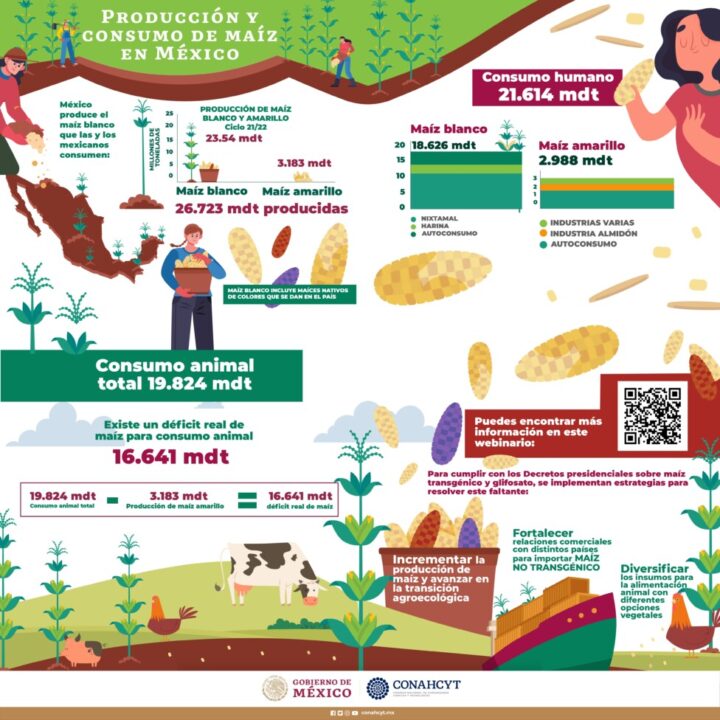MEXICO CITY, Mar 14 (IPS) – Mexico has taken important steps to protect native corn, even standing up to its largest trading partner, the United States, to do so. But the lack of a comprehensive legal framework in its policy towards genetically modified crops allows authorizations for other transgenic crops.
In fact, the dispute with Washington over corn exposes the regulatory gaps regarding opposition to the use of genetically modified organisms (GMOs) in Mexican agriculture.
Experts consulted by IPS concurred with the need for a better legal framework to strengthen the evaluation of GMOs.
Monserrat Téllez, a researcher at the non-governmental Seeds of Life Foundation, pointed out that GMOs appeared after the reform of agricultural and trade policies derived from the 1994 North American Free Trade Agreement (NAFTA) between Canada, the United States and Mexico.
These free trade policies, she added, harmed Mexican farmers by eliminating subsidies and opening the market to imports.
“There was already a concern about regulation. The aim of the law was to boost planting. Although there is a special regime (for corn), it is not enough. It is not only a genetic reservoir, but also includes a series of traditional cultivation practices. The basis should be the precautionary principle, we would like very careful regulation,” she told IPS.
Téllez was referring to the Law on Biosafety of Genetically Modified Organisms, in force since 2005, which specifies three types of cultivation.
Experimental plantations must be in controlled areas, protected to prevent contamination, with risk assessments and other safeguards. In pilot plantations they are optional, and in commercial plantations they do not exist.
However, Mexico lacks an effective GMO monitoring system, say the experts.
In the case of corn, it applies a special protection regime that, based on the centers of origin and diversity of corn and its wild relatives, prohibits the release of GMOs in certain areas.
Lessons learned
In December 2020, the current government of Andrés Manuel López Obrador issued a decree ordering the replacement of the herbicide glyphosate with environmentally friendly alternatives by Jan. 31, 2024 and putting a halt to permits for the planting of genetically modified corn and its use in the food industry.
In order to ingratiate itself with the industry, and therefore with the United States, the Mexican government softened the decree by endorsing the importation of yellow corn for industrial and animal feed purposes, but it failed to win over the United States.
During the last few months of 2022 and the first months of 2023, both governments held several unsuccessful technical meetings to resolve the conflict.
For this reason, the United States announced last August the opening of a dispute settlement panel within the framework of the United States-Mexico-Canada Agreement (USMCA), based on the chapter on sanitary and phytosanitary measures.
However, it does not mention the chapter of the USMCA, in force since 2020 and which replaced NAFTA, on biotechnology and its trade, which is the elephant in the room, since in the background lies the use of biotechnological products.
At these meetings, the Mexican government conveyed to its U.S. counterparts that the priority was corn, for environmental, health and cultural reasons, and that they were not concerned about other crops, such as canola or soybeans.
The United States accuses its partner of applying excessive measures, lack of scientific evidence on the effects of GMOs and economic damage to corn exports.
In its response dated Jan. 15 and published on Mar. 5, Mexico presented scientific studies that demonstrate the negative impact of GM crops on animals such as rats and on the environment, while at the same time showing that the economic damage complained about by the U.S. did not exist.
The planting of GM corn has been blocked since 2013, when a group of 53 people and 20 small farmer, indigenous, academic, scientific, artistic, consumer and gastronomic organizations won an injunction in a class action lawsuit filed for damage to the biological diversity of native corn and the rights to food and health.

The three million corn farmers who plant around eight million hectares allocate two million to family consumption, in a country that has 64 varieties and 59 native ones.
Mexico is the world’s seventh largest corn producer and the second largest importer of corn, producing some 27 million tons annually. But it still has to import some 20 million tons to meet domestic consumption.
Corn is not only a native and predominant crop in Mexico, but a staple in the diet of its 129 million inhabitants that goes beyond the culinary sphere and is part of the country’s cultural roots.
Despite the promises made, GMOs have not raised agricultural yields, improved pest resistance or offered greater resistance to the effects of the climate crisis, such as drought. Moreover, there is evidence of damage to health.
The planting of genetically modified soybeans offers lessons on regulation. In 2012, US biotech transnational Monsanto obtained a commercial planting permit for some 235,000 hectares in seven Mexican states.
After a legal battle, the Mexican Supreme Court blocked the authorization in 2015 due to potential environmental damage and lack of consultation with affected indigenous communities.
But in the southeastern state of Campeche the crop has expanded, with strong impacts on biodiversity and beekeeping, as foreseen by the government’s National Commission for Knowledge and Use of Biodiversity, which recommended not approving the permit in 2012.
Despite the loopholes, the lawmakers of the governing National Regeneration Movement (Morena) have not modified the legal framework.
“The formal regulatory framework has shortcomings. There are no clear criteria, and there is a lack of clarity on precautionary measures. The law includes special protection for corn, but it is not defined in the regulations. So any authority can interpret it in its own way,” Alma Piñeyro, a researcher at the public Autonomous Metropolitan University, based in Xochimilco, south of Mexico City, told IPS.
This country is the origin and center of corn and cotton cultivation and the government bases its control on this, but the history of GM soybeans shows the lack of breadth of the approach. Therefore, GMOs should be regulated more strictly than corn and with specific measures for each crop.
Unbalanced figures
In Mexico, the release of GMOs into the environment began in 1988, with an authorization for a tomato planting trial, which has since expanded to 19 crops. Since then, agribusiness has focused on crops such as cotton, corn and soybeans.
Statistics from the government’s Interministerial Commission on Biosafety of Genetically Modified Organisms on requests and approvals are inconsistent, contradictory, if not inaccurate, which hinders evaluation, according to the review by IPS.
Between 2005 and 2021, Mexican authorities issued 671 permits, of which 359 were for cotton, 202 for corn, 50 for wheat, 44 for soybeans and the rest for other varieties. The vast majority consisted of experimental licenses, although the total does not match the reported number of permits.
Mexico’s official response to the U.S. complaint, made public on Mar. 5, lists 651 permits, of which 53 percent are for cotton and 30 percent for corn, suspended by the 2013 class action lawsuit.
The administration of López Obrador, who took office on Dec. 1, 2018 and whose term ends on Oct. 1, slowed the pace of approval of GM crops.
In 2022, it rejected six applications for corn, five for cotton, one for soybeans and one for canola. But between that year and the next, it endorsed four permits for canola, two for cotton, two for potatoes and one for soybeans.
On the corn panel, five Mexican and five U.S. non-governmental organizations are preparing to submit comments by Friday, Mar. 15, in an attempt to support the Mexican position.
Piñeyro said it is necessary to analyze each species in the Mexican context.
“Canola, as a crop, can become invasive, because it survives weeds and can displace other native species. It has undergone genetic dispersal, which has happened in Canada, where they have an agronomic problem, and it could happen in Mexico. The monitoring data are opaque. Without sufficient data, it is very difficult to evaluate the whole picture,” she said.
Téllez said the panel with the United States is decisive. “If we win, we will call into question a model of production. We will take a huge step forward, we will set an international precedent. But if corn is defeated in its center of origin, we will see the same in the birthplaces of other crops, and the offensive strategy of the companies will be strengthened,” she stressed.
The USMCA review is scheduled for 2026 and its future appears to be tied to that of corn.
© Inter Press Service (2024) — All Rights ReservedOriginal source: Inter Press Service















